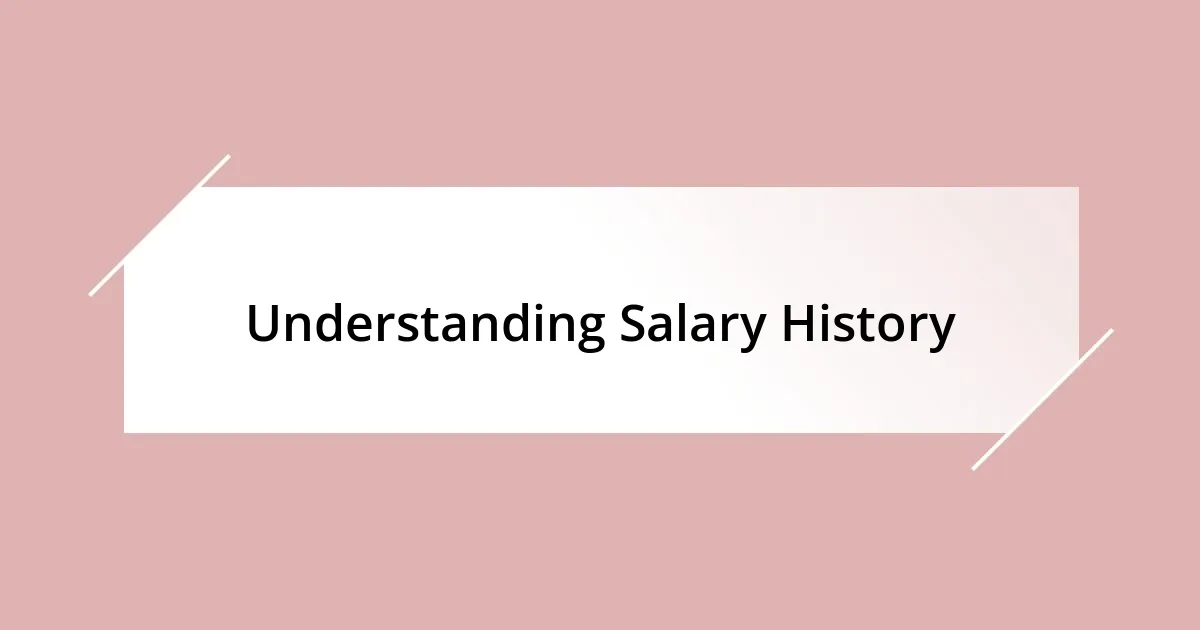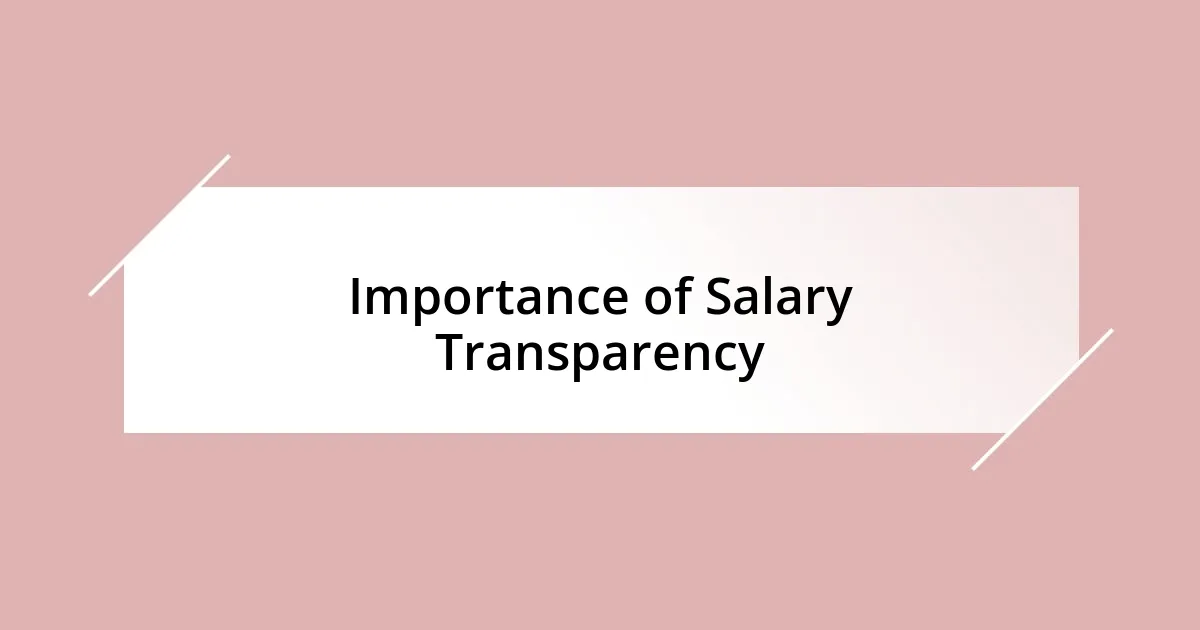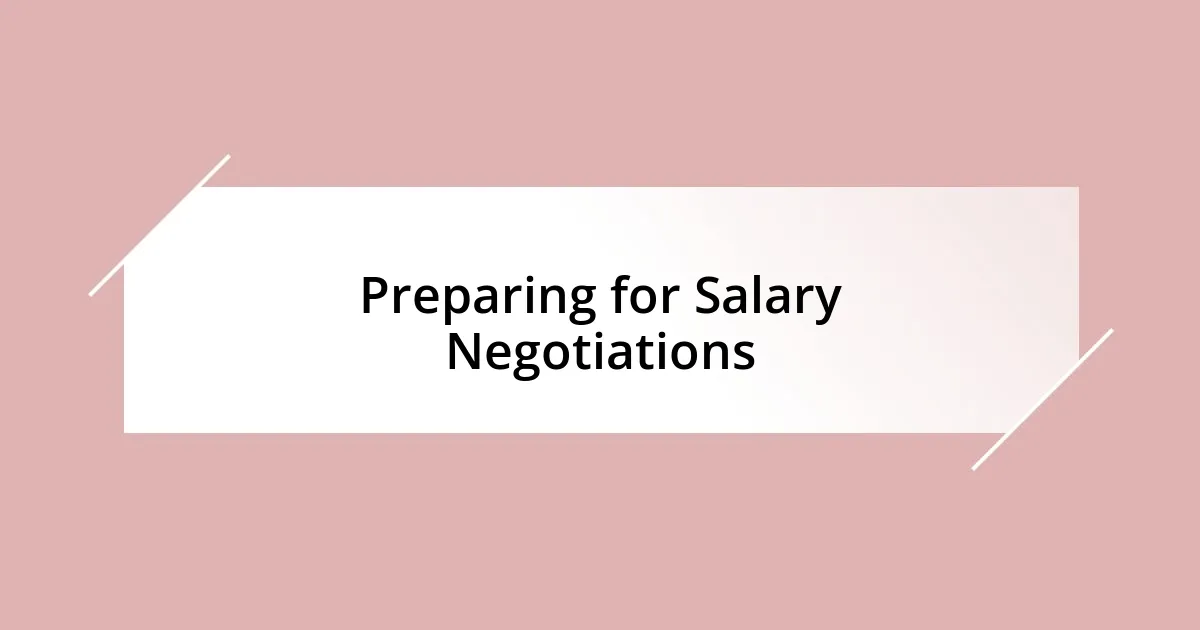Key takeaways:
- Understanding salary history reflects career growth and should focus on current skills rather than past salaries for better negotiations.
- Salary transparency enhances trust, reduces pay inequality, and attracts top talent by fostering open conversations about compensation.
- Collecting salary data through various methods, like online databases and networking, empowers individuals to make informed career decisions.
- Factors influencing salary changes include experience, market demand for skills, and overall company performance, highlighting the need to stay proactive in skill development.

Understanding Salary History
Understanding salary history can sometimes feel like unraveling a mystery. I remember the first time I was asked about my previous salaries during a job interview; I was caught off guard. It made me question, why do employers care so much about what I was paid before?
As I dug deeper, I realized that salary history often reflects a person’s growth and potential in their career. I discovered that it’s not just about numbers; it’s about the journey. Each figure tells a story of my hard work, my evolving skills, and even the economic climate of my past jobs. Have you ever thought about how your salary history shapes your professional identity?
It’s interesting how some organizations use salary history to gauge what they might offer a candidate. In my experience, that’s a slippery slope. I believe that our worth isn’t solely defined by previous salaries and that discussing expectations rather than history can lead to healthier negotiations. What do you think? Doesn’t everyone deserve to be assessed based on their current skills and the value they bring to the table?

Importance of Salary Transparency
Salary transparency plays a crucial role in fostering trust between employers and employees. In my experience, when companies openly share salary ranges for various positions, it creates an environment of honesty. This openness reduces the anxiety around compensation discussions, making it easier for everyone to feel valued. Have you ever wondered how it might feel to walk into a negotiation knowing both parties are on the same page?
Moreover, transparency helps diminish pay inequality. I remember a colleague who discovered that she was being underpaid compared to others in similar roles. This realization sparked a crucial conversation, leading to a pay adjustment that reflected her contributions. It’s a reminder that when salary information is shared, it empowers employees to advocate for themselves and ensures fairness within the workplace.
Lastly, transparency can attract quality talent. When job seekers see that a company values clear communication about salaries, it can be a major draw. My own decision to join my current organization was heavily influenced by their commitment to equitable pay practices. It felt reassuring to know they valued their employees enough to be open about compensation.
| Benefits of Salary Transparency | Impact on Employees |
|---|---|
| Builds trust | Increases job satisfaction |
| Reduces pay inequality | Helps employees advocate for themselves |
| Attracts top talent | Encourages a healthy workplace culture |

How to Collect Salary Data
Collecting salary data requires intentionality and a strategic approach. One effective method is leveraging online salary databases and professional networks. I remember joining various platforms like Glassdoor and LinkedIn to survey what others in my field were earning; it opened my eyes to the salary ranges out there. Tapping into discussions in forums or industry groups can also provide valuable insights.
Here are some practical tips to gather salary data more effectively:
- Utilize Salary Surveys: Participate in surveys from industry associations to gain access to compiled salary ranges.
- Network: Share experiences with colleagues and peers, as casual conversations can reveal unexpected insights.
- Research Job Boards: Browse listings on job boards that often include salary information in their postings.
- Seek Input from Recruiters: Connect with recruiters who have a pulse on the market and may share salary insights freely.
- Explore Company Reviews: Read employee reviews and comments on sites that break down salaries by role within specific companies.
Finding the right salary data isn’t about just numerical values; it’s about understanding your worth in the broader landscape. I felt a rush of confidence when I realized I wasn’t alone in my pay range and could make more informed decisions in my career. Each piece of information contributes to an evolving narrative about our professional journeys.

Analyzing Your Salary Trends
Understanding the patterns in my salary history has been a true eye-opener. I’ve noticed that certain roles brought higher pay right from the start, while others didn’t budge much over the years. Have you ever looked back and realized how your moves—like taking on new responsibilities or switching jobs—impacted your earning potential? This reflection can be enlightening, revealing what changes truly mattered in your professional trajectory.
When I took the time to compare my salary progress with industry standards, it felt like uncovering a hidden narrative about my career. For instance, I discovered that while my base salary had seen modest increases, my bonus structure was significantly below the industry average. This prompted me to have a proactive conversation with my manager. It’s funny how just a little analysis can empower you to advocate for what you’re worth.
Additionally, I found that analyzing trends wasn’t just about numbers; it was about emotions tied to my achievements. I vividly remember feeling deflated after realizing my compensation didn’t reflect the long hours I’d put in during a big project. By documenting these emotions alongside the data, I gained clarity on my worth and the importance of negotiating for a salary that truly represents my contributions. Have you captured those feelings in your own salary journey? They can be just as crucial as the figures themselves.

Factors Affecting Salary Changes
Salary changes don’t happen in a vacuum; various factors play a role in determining our pay. One key element is experience; I learned firsthand how each year in a role can incrementally boost my earnings. When I transitioned into my current position, I realized just how significant my previous experience was—negotiating my salary was much easier because I could substantiate my value with concrete examples from my past.
Moreover, market demand for your specific skills can greatly influence salary hikes. I remember when my expertise in a niche software skyrocketed in demand, and I saw colleagues being courted with offers far beyond what we were making at that moment. It’s a stark reminder that being proactive about skill development can shape our salary trajectory—if the market’s looking for something, being the person who provides it can lead to a tangible payoff.
Lastly, company performance and economic conditions can’t be overlooked. I once worked for a company that flourished during an economic upswing, and my salary reflected that growth. It taught me that external factors can sometimes outweigh our individual achievements; have you considered how much of your salary evolution is tied to broader market conditions? Reflecting on this can add context to your earnings journey and help you navigate future pay discussions more effectively.

Preparing for Salary Negotiations
When it comes to preparing for salary negotiations, I believe that clarity is key. I recall a time when I walked into a negotiation fully armed with detailed research on industry standards and my own worth, driven by a newfound confidence in what I had to offer. It was exhilarating to present data alongside my achievements, allowing me to navigate the conversation with conviction. Have you ever felt that sense of empowerment when you truly understand your value?
Another vital aspect of readiness is practicing what you’ll say. I vividly remember rehearsing my main points in front of a mirror before a big conversation, which may sound a bit silly, but it made such a difference. By anticipating objections and preparing thoughtful responses, I was able to keep the discussion focused on my contributions rather than getting sidetracked by emotions. How do you prepare to face the uncertainty that can often come with negotiations?
Lastly, I think it’s important to enter negotiations with a flexible mindset. During one memorable discussion, I had to adjust my expectations on salary when my employer presented a comprehensive benefits package instead. While it wasn’t what I originally aimed for, recognizing the overall compensation allowed me to feel satisfied in the end. It’s a reminder that sometimes, the value of a job goes beyond just the salary figure itself. What factors do you consider important in your salary negotiations?














